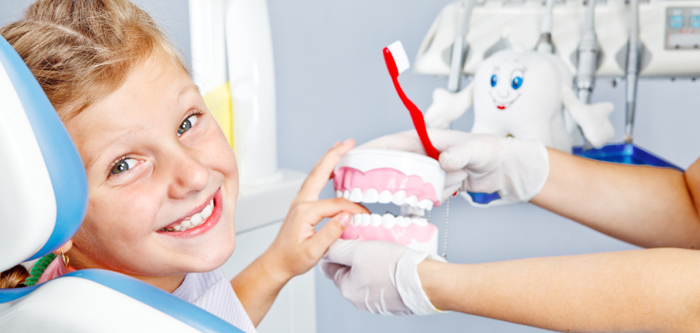
If you have a concern about your child’s teeth, gums or mouth, your first step should be to see your dentist. If you are still worried, you can ask your dentist to make a specialist referral to hospital to see a paediatric consultant. Rarely a dental abnormality can be the first sign of an illness or rare condition.
More information & FAQs
At an appointment with a paediatric dentist, parents will be given time to voice their concerns. If you are only wanting background information on issues affecting children’s oral health, do take a look at our resources for parents, teachers and the dental profession.
When should I start teaching my child about tooth-brushing?
As soon as your child’s teeth start to come through, introduce them to the idea of cleaning. Use a little bit of cloth or small soft toothbrush to clean the teeth so your child gets used to it. As more teeth come through, brush regularly and then encourage them to do their own brushing with supervision from you. Between the ages of 3 and 6, add to the brush a children’s toothpaste with 1000ppm (parts per million) of fluoride in it. Children learn good habits from watching what happens in the home and you can set a good example by brushing and flossing your teeth twice a day.
When should I take my child to the dentist for the first time?
As soon as your child is aware of what’s going on around them, take them to the dentist so they become familiar with the experience. Their first visit might be to accompany you or someone else in the family for a routine appointment.
When do a child’s teeth first come through?
Most of us have 20 baby or primary teeth which come through from the age of about 6 months to two years old, but this can vary greatly. Babies’ first teeth fall out gradually from the age of 3 to be replaced by permanent teeth. Wisdom teeth, or third molars, are the last to emerge between the ages of 17 and 25. Most of us will end up with 32 teeth.
I live in a fluoridated area – is fluoride in toothpaste still necessary?
Everyone should use a fluoride-containing toothpaste. Studies have shown that there is added benefit in using a fluoride-containing toothpaste for those consuming fluoridated water, just as there is a need for water fluoridation even when everyone is using a fluoride-containing toothpaste.
Is it okay to give my child a dummy (pacifier)?
Sucking is a natural reflex in a young child and a dummy may be a useful aide to help soothe your baby. The important thing is never to dip the dummy in anything sweet and never use a dummy that has juice in it.
Should thumb-sucking be discouraged?
Thumb-sucking is entirely natural and a great comfort to young children. Many children suck their thumb or fingers. If your child reaches the age of 5 and the habit seems in danger of becoming established, it may be time to start discouraging them, but never punish. A child who sucks their thumb with great intensity once they reach school age may develop speech or orthodontic problems. Your dentist should be able to advise you on the best course of action.
I would like to bottle-feed my child; is there any reason why not?
Many parents bottle-feed their children and this is a good way to involve fathers and other family members in caring for babies. The important thing is not to leave your growing child with the bottle, especially overnight and don’t give your child juice or fruit squashes, just milk or water. As soon as your child is old enough, encourage them to drink from a free-flowing cup.
What is your advice on breast-feeding?
Breast-feeding is supported by healthcare practitioners because it naturally provides babies with the sustenance and antibodies they need. It’s recommended breast-feeding continues until the baby is six months. Thereafter, solid foods can be introduced and breast-feeding can be gradually phased out.
Why is fluoride important?
Fluoride is highly beneficial to teeth which is why it’s routinely added to toothpaste. In some areas of the UK, fluoride, which is a naturally occurring mineral, is also added to the drinking water. (A recent report from Public Health England showed that 45% fewer children aged one to four living in fluoridated areas are admitted to hospital for tooth decay than in non-fluoridated areas.)

